
This post provides a detailed look at the best B2B platforms, showcasing their key features and how they benefit ecommerce. By understanding these details, you can make better-informed decisions. If you need more information about the leading international ecommerce platforms, contact us anytime.
Reading time: 25 min.
Selecting the ideal B2B wholesale ecommerce platform that meets your business requirements takes a lot of work. The numerous ratings available make it more complicated. However, the silver lining is that as a business owner, you have a wiggle room. You can choose the appropriate option with worthy features for your company to thrive—and do it swiftly.
In this article, IntexSoft will scrutinize prime specifics. We will put together various ratings to paint a clear picture. Easily navigate through the top B2B ecommerce platforms, uncovering what sets them apart, their strengths, and where they might fall short. By the end, not only will you be well-informed, but you will also be armed with the knowledge to pick the perfect option.
Let’s embark on this insightful journey!
A B2B trading platform is a digital hub exclusively designed for businesses to conduct transactions, trade, and commerce among themselves. It serves as a specialized marketplace catering specifically to business-to-business interactions.
These platforms offer tailored features such as bulk purchasing options, specialized catalogs, and negotiated pricing. This is streamlining the procurement process for companies.
Customized B2B ecommerce solutions are essential for smooth business interactions, helping companies trade better and work together effectively across different industries. As a result, profits will rise.
What is the smartest way to do it?
Now that we understand what B2B ecommerce software solutions entail, it’s time to explore the best options in today’s market. As mentioned earlier, there’s a variety of ratings.
However, among the noteworthy ones, IntexSoft can highlight the following:
Determining the premier B2B ecommerce platform requires a systematic approach. We meticulously assess the unique features each platform offers.
Our selection criteria for identifying the top platforms are multifaceted:
Combining these factors and insights from trusted sources, our handpicked list of top B2B ecommerce platforms helps businesses make informed choices.
Here’s an outline covering essential features for B2B commerce solutions.
In the realm of platform security, there is an earnest dedication to safeguarding sensitive data and transactions. These platforms ensure data security through cutting-edge encryption protocols throughout their journey—in transit or at rest. Their strict commitment to data privacy and following global standards such as GDPR, HIPAA, or PCI DSS highlights how seriously they ensure data stays private and comply with regulations.
Moreover, B2B ecommerce platforms emphasize security through advanced authentication methods such as two-factor authentication (2FA) or biometric authentication. These sophisticated layers of protection fortify user accounts and transactions, enhancing overall security measures.
B2B commerce solutions are experts in expanding businesses worldwide while seamlessly adapting to different business scenarios. Here’s how they assist businesses in reaching international markets effortlessly:
B2B ecommerce platforms facilitate global expansion and adaptability while complying with various regulations, making international business endeavors easier for companies.
B2B ecommerce platforms equip businesses with an array of dynamic customization tools, empowering them to personalize their offerings and experiences to meet diverse client demands:
The best ecommerce platform for manufacturers specializes in seamlessly fusing multiple channels, creating a unified business presence that resonates across diverse platforms:
B2B ecommerce platforms embody three essential pillars: scalability, reliability, and performance, crucial for seamless business operations.
Key to these platforms is their unwavering dedication to optimal performance. They prioritize swift responsiveness, rapid page loading, and streamlined transaction processing. This commitment isn’t just about technological prowess; it’s about enhancing user engagement, driving conversion rates, and ensuring exceptional customer satisfaction.
Furthermore, these platforms boast a steadfast commitment to availability. They’re fortified resilient disaster recovery strategies, ensuring uninterrupted service delivery.
Advanced analytics tools delve into rich customer data, dissecting behaviors, purchase trends, and market shifts. They empower businesses to navigate the competitive landscape armed with data-driven strategies.
Moreover, these platforms offer real-time performance monitoring, assessing vital KPIs to gauge business health and campaign effectiveness. This depth of insight allows businesses to refine their approaches, ensuring sustained growth and market agility.
The personalized insights from customer data enable tailored marketing and bespoke customer experiences. This nuanced understanding fosters enduring relationships, cementing customer loyalty.
Anticipatory analytics capabilities allow businesses to forecast market trends and proactively plan for future demands. This foresight ensures adaptability in a rapidly evolving market.
In summary, B2B ecommerce platforms are dedicated to ensuring customer satisfaction. They achieve this by providing support systems and easy-to-use interfaces. These elements help users carry out transactions smoothly and efficiently and manage tasks independently.
The best ecommerce platform for B2B incorporates these features, providing a secure, adaptable, and personalized experience while ensuring scalability, performance, data-driven insights, and exceptional customer support—essential elements for successful B2B transactions and business growth.
Now that you have grasped the essence of our approach let’s delve into the specifics of top-tier B2B platforms we have identified:
Here is a comparative analysis of the mentioned B2B ecommerce platforms, highlighting their key features, customization options, integration capabilities, scalability, and pricing.
| Platform | Features | Customization | Integration | Scalability | Pricing |
| Shopify | Easy setup and use (dashboard integrates order management, secure payment systems, and intuitive mobile commerce). An advanced analytics toolkit and a diverse app store for extensions. | Shopify’s default theme allows limited customizations, constraining the creation of a truly unique store beyond minor adjustments. | Effortless integration with your email marketing platform, CRM, customer support tool, and over 1,000 other applications. | Appropriate for companies ranging from small to medium size. | Pricing plans range from $39 per month. $399 per month for premium features. When billed annually, the price is lower. Transaction fees are 0.5% – 2.0%. |
| Magento | Extensive customization, robust feature set (mobile-friendly user experience, SEO friendliness, reporting, and analytics), and consultation services. | High level of customization. An array of pre-designed themes and templates make this process efficient for developers and business owners. | This encompasses payment solutions, shipping services, and order tracking facilities. Magento seamlessly integrates important third-party solutions. | Scalable for small to large enterprise solutions. | Various pricing options. Magento Commerce costs $1,988 per month. None transaction fees. |
| BigCommerce | Product management. Beautiful and convenient for the user interface. Payment gateways. Multi-channel selling (Amazon, eBay, and OnBuy). 24/7 support. | BigCommerce offers a degree of flexibility through its control panel. However, these options have some limitations that may restrict extensive customization. | Good integration capabilities. Connections to well-known payment gateways, shipping solutions, marketing platforms, and more. | Suitable for small to midsize businesses. | The pricing plans range from $29 to $299 per month if you opt for annual billing. The most popular plan is priced at $79. Transaction fees are 0.5% – 1.5%. |
| Salesforce | Advanced CRM integration. AI-powered analytics. | Moderate customization. | Wide range of integrations. | Scalable for mid-size to large enterprises. | Various pricing tiers. They are counting individually. |
| SAP Commerce Cloud | Strong ERP integration. Robust analytics. | Extensive customization. | Diverse integration options. | Highly scalable for large enterprises. | Custom pricing based on requirements. |
| Oracle | Comprehensive analytics. Advanced order management. Multilingual and multi currency support. Strong security. | Extensive customization capabilities. | Broad integration possibilities. But time consuming restrictions. | Highly scalable for large businesses. | Custom pricing. |
| OpenCart | Cost-effective. User-friendly. Pre-installed essential features. | Moderate customization. | Good integration options. | Suitable for small businesses. | Free with paid extensions available. |
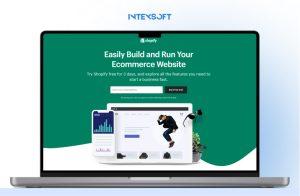
Undoubtedly, Shopify enjoys widespread popularity, and several reasons exist for its ubiquity. User-friendly interface, reliability, integration flexibility, and comprehensive features come together seamlessly in one platform, making it perfect for entrepreneurs starting their online businesses.
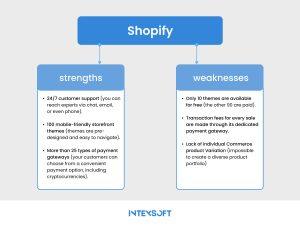
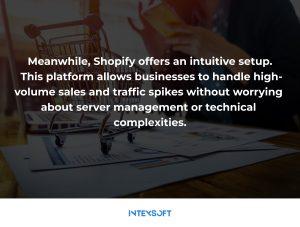
When it comes to Shopify’s comprehensive features, one standout aspect is its robust analytics toolbox:
These tools offer important insights, identifying areas to enhance your store’s appeal to customers. Understanding user behavior secrets can be a game-changer in maximizing earnings, wouldn’t you agree?
Prominent brands like Kylie Cosmetics and Gymshark proudly leverage Shopify’s platform.
IntexSoft is spotlighting various aspects of this platform in our blog. For example, you can discover more practical insights about Shopify in our Magento to Shopify migration article.
Now, let’s embark on Magento.
Adobe Commerce (or Magento), a leading ecommerce solution introduced in 2008, has maintained its market position. The recent launch of Magento 2 brings significant enhancements, aiming to improve features and functionalities for developers and store owners. This update is anticipated to deliver an improved overall experience compared to the previous version. Visit our blog for insights on migrating to Magento 2, hiring Magento developers, generating a sitemap in Magento 2, and more.
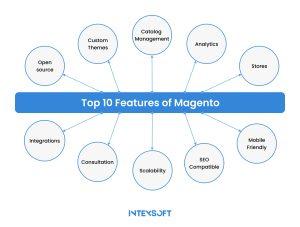
Among the array of valuable features in the latest Magento iteration, let’s spotlight its SEO optimization prowess. A strong SEO strategy is your best friend for driving organic traffic in the ever-evolving online sphere. Magento 2 offers essential features like Google-friendly sitemaps, dynamic URLs, smart link management, metadata configurations, optimized image loading, and a responsive design. These functionalities closely adhere to Google’s criteria, ensuring your store’s visibility to users searching for products or services that your online store offers.
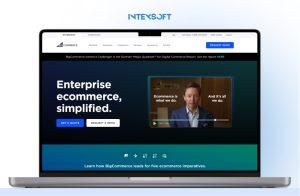
BigCommerce operates as a B2B ecommerce SaaS (software as a service) solution, meaning a monthly fee is necessary for access rather than owning the software outright. However, scaling up can be challenging due to its SaaS nature, potentially leading to increased costs for rapidly growing businesses.
On the positive side, BigCommerce offers marketing utilities and supports multi-channel selling.
Despite being among the smaller ecommerce platforms, BigCommerce proudly boasts a clientele that includes established brands like Ted Baker, BMW, and Ben and Jerry’s.
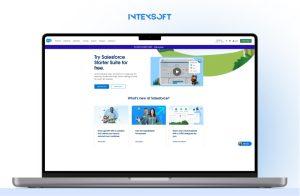
Salesforce isn’t just about customer relations; it’s also a powerhouse in B2B ecommerce with its Salesforce B2B Commerce platform.
This solution empowers companies to streamline sales procedures, manage intricate product catalogs, and offer an unparalleled buying journey to their clientele. Its customization options set it apart, allowing businesses to match their brand vibes.
Moreover, this platform seamlessly integrates with Salesforce’s suite of CRM tools, guaranteeing a comprehensive perspective on customer engagements.
With robust features like order management, adaptable pricing structures, mobile optimization, and AI-driven personalization, Salesforce B2B Commerce is the go-to solution that should be considered.
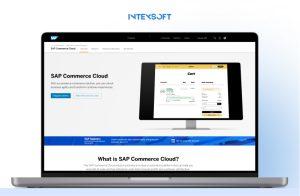
SAP was a trailblazer in the realm of enterprise software solutions, continually expanding its prowess into the B2B e-commerce arena. Aligning with the core focus of its competitors, SAP is good at streamlining and enhancing B2B operations, providing businesses with robust tools to refine sales, procurement, and customer engagement, detailed in the comparison table above.
What distinguishes SAP is its cloud-native nature, meticulously crafted for larger enterprises. Yet, it’s important to acknowledge that not every facet of this platform meets contemporary demands, and certain functionalities are now obsolete in some cases. Given its extensive feature set, onboarding and support could unfold over several quarters. Moreover, SAP may entail substantial costs and time investments.
SAP’s strategic plan is of prime importance in phasing out support for its older systems by 2027. Consider that.
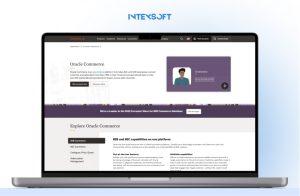
Oracle Commerce, an established enterprise ecommerce software, offers seamless integrations with other separate solutions. However, it appears outdated and more suitable for businesses aiming for minimal adjustments. Its future support remains uncertain.
Oracle’s merits include support for multiple languages and currencies, catering to B2B sellers handling international clients and their diverse language and currency needs. In IT security, Oracle remains steadfast in ensuring robust data protection, an important aspect of secure B2B transactions.
However, Oracle’s development lacks recent momentum, roadmaps, or feature updates. Additionally, its extensive features may overwhelm users unfamiliar with such comprehensive systems. The initial investments and ongoing maintenance costs could be notably high for smaller businesses.
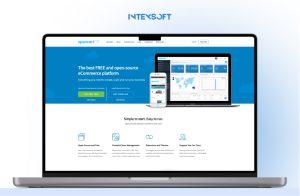
OpenCart stands as a time-tested, open-source B2B e-commerce platform known for its extensive experience in the market—a testament to its trustworthiness in supporting businesses.
Recognized for its friendly interface, OpenCart is an excellent pick for newcomers stepping into the ecommerce field. It excels in its straightforward setup, offering essential tools to kickstart an online store seamlessly. Plus, there are over 30 payment gateways at your disposal. It effortlessly integrates with multiple third-party ecommerce solutions, ensuring adaptability in running your online store.
Selecting the ecommerce solution requires a comprehensive assessment of your business’s unique needs and potential growth trajectory. Consider aspects like your specific complexities and your envisioned development over the next 1 to 5 years.
Among the top recommendations by IntexSoft, Shopify Plus and Magento stand out for their adaptability. However, if your business operates with distinct demands that diverge from conventional standards, exploring alternative platforms might better suit your requirements.
To make an informed decision, consulting industry experts or using trial periods can be a holy grail that offers valuable insights. As a result, you will pinpoint the perfect fit for your business.
Choosing the right B2B e-commerce platform is not just about picking the trendiest or newest technology available. It’s about finding the right solution that aligns with your business goals. What works for one business may not necessarily work for another. It’s essential to assess where your priorities lie and ensure the platform’s capabilities match your unique requirements. If reliability is crucial, robust off-the-shelf solutions are accessible. If expanding within budget limitations, starting with more straightforward options might be the best strategy. Forward-thinking investments might lead you to consider modern open-source solutions. But how can you assess these aspects without making mistakes?
At IntexSoft, our experts are always available to address such issues swiftly. We’re dedicated to guiding you in finding the perfect match for your business needs. If innovation is your focus, let’s explore IntexSoft’s capabilities together.
Reach out to us for a free consultation, and we’ll navigate the options hand in hand!
B2B platforms emphasize intricate pricing models and specialized account functionalities, facilitating bulk orders, personalized catalog presentations, and addressing the distinct requirements of businesses.
Take into account elements such as scalability, flexibility in customization, integration prowess, security features, mobile adaptability, and personalized support services designed to suit your business requirements.
Scalability is vital as your business grows. A platform should handle increasing product catalogs, users, and transactions without compromising performance or functionality.
Look for seamless integrations with ERP, CRM, accounting software, shipping, payment gateways, and inventory management systems for a comprehensive business solution.
Yes, customer support is essential. Look for platforms providing robust, responsive, and accessible support, particularly tailored to B2B challenges and business hours.
A secure B2B platform should offer data encryption, secure payment gateways, user authentication, compliance with industry standards, and regular security updates.
Indeed, mobile adaptability holds immense importance. Verify that the platform provides responsive layouts, dedicated mobile applications, and cohesive user interactions irrespective of devices, acknowledging the escalating dependence on mobile devices for business functions.